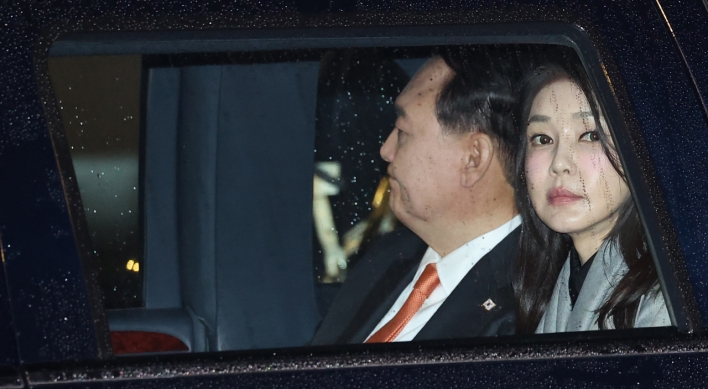But doctors refuse to join campaign, criticize resolution as ‘shaming’
Thirteen health industry interest groups on Wednesday vowed to stem the long-standing illegal rebate practice in drug trade and set the market order straight.
However, the largest association of doctors, a key component of the health industry, refused to join their campaign, inviting public criticism and suspicion over the feasibility of the project.
At the Press Center in downtown Seoul the groups announced their resolution to abolish the rebate practice that has “shaken the basis of the Korean medical industry.”
Thirteen health industry interest groups on Wednesday vowed to stem the long-standing illegal rebate practice in drug trade and set the market order straight.
However, the largest association of doctors, a key component of the health industry, refused to join their campaign, inviting public criticism and suspicion over the feasibility of the project.
At the Press Center in downtown Seoul the groups announced their resolution to abolish the rebate practice that has “shaken the basis of the Korean medical industry.”

“Some people and companies have tarnished our honors by committing illegal practices but it is time we root it,” said Seong Sang-cheol, head of the Korean Hospital Association, which led the movement. Those who joined the resolution are representatives of hospitals, pharmaceutical companies, Oriental medical doctors, chemists, medical equipment manufacturers, wholesalers, dentists and others.
Illegal rebate practice refers to drug makers’ returning a portion of profits to doctors or hospitals in exchange for prescription of their products. According to the Fair Trade Commission, the domestic pharmaceutical market is estimated at 10.5 trillion won as of 2006. The amount of money used for rebate is about 10-30 percent of the total revenue. This practice has been blamed as the major culprit for soaring drug price and its national health insurance coverage fee.
The Ministry of Health and Welfare in 2010 adopted a rule to punish both rebate providers and recipients in order to stabilize the pharmaceutical market.
However, the Korean Medical Association, the largest group of medical doctors, refused to sign, claiming that the resolution brings shame upon doctors.
“The announcement makes the doctors, the claimed recipients of the rebate, immoral figures,” the association said in a press release. The KMA has previously come under fire for alleging that the rebate is a “natural part of market capitalism.”
“The only way to enhance transparency in medical service is for the government to deregulate medical fees. Regulating ethics by law is outdated,” it said.
The ministry said it will fully support the execution of the resolution.
“It regrettable that the KMA decided not to join the resolution,” said Yang Seong-il, the ministry spokesman. “It would have been very meaningful since doctors are one of the main axis in abolishing the rebate practice.”
Yang said many doctors agree that the rebate practice should be stemmed.
“We hope that doctors in the field will voluntarily and individually carry out their ideas. This is a very big step forward in gaining public credibility,” he said.
By Bae Ji-sook (baejisook@heraldcorp.com)
-
Articles by Korea Herald



![[AtoZ Korean Mind] Does your job define who you are? Should it?](http://res.heraldm.com/phpwas/restmb_idxmake.php?idx=644&simg=/content/image/2024/05/06/20240506050099_0.jpg&u=)















![[K-pop's dilemma] Is Hybe-Ador conflict a case of growing pains?](http://res.heraldm.com/phpwas/restmb_idxmake.php?idx=642&simg=/content/image/2024/05/07/20240507050746_0.jpg&u=)